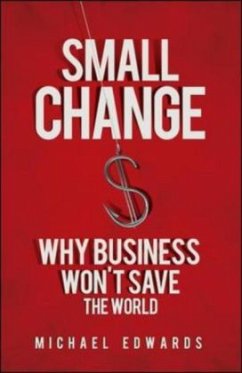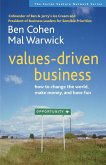A former Ford Foundation director takes a critical look at the role of for-profit companies in philanthropy and exposes the troubling risks and downsides.
A new movement is afoot that promises to save the world by bringing the magic of the market to philanthropy. Nonprofits should be run like businesses, its adherents say, and businesses can find new sources of revenue by marketing goods and services that benefit society. What could be wrong with that?
Plenty, argues Michael Edwards. In this hard-hitting, controversial expose he marshals a wealth of evidence to show just how far short the promise of so-called philanthrocapitalism has fallen, and why the whole concept is fundamentally flawed. Some business practices can be beneficial to nonprofits, and it s definitely a good thing that the for-profit sector is developing a social conscience. Edwards carefully specifies when businesses and business thinking can help. But to really get at the root causes of the systemic problems most nonprofits wrestle with hunger, poverty, disease, violence a completely different way of operating is required.
Social transformation demands cooperation rather than competition, collective action more than individual effort, and patient, long-term support for solutions over short-term results. Philanthrocapitalism concentrates power in the hands of a few major players, mirroring the very inequities civil organizations should be trying to ameliorate. With a vested interest in the status quo, it shies away from fundamental change. At most all it can promise is valuable but limited advances: small change. Ultimately, Edwards declares that the use of business thinking can and does corrupt civil society. It s time to differentiate the two and re-assert the independence of global citizen action.
Anyone who wants the truth of philanthropy in America should read this book. Robert B. Reich
A new movement is afoot that promises to save the world by bringing the magic of the market to philanthropy. Nonprofits should be run like businesses, its adherents say, and businesses can find new sources of revenue by marketing goods and services that benefit society. What could be wrong with that?
Plenty, argues Michael Edwards. In this hard-hitting, controversial expose he marshals a wealth of evidence to show just how far short the promise of so-called philanthrocapitalism has fallen, and why the whole concept is fundamentally flawed. Some business practices can be beneficial to nonprofits, and it s definitely a good thing that the for-profit sector is developing a social conscience. Edwards carefully specifies when businesses and business thinking can help. But to really get at the root causes of the systemic problems most nonprofits wrestle with hunger, poverty, disease, violence a completely different way of operating is required.
Social transformation demands cooperation rather than competition, collective action more than individual effort, and patient, long-term support for solutions over short-term results. Philanthrocapitalism concentrates power in the hands of a few major players, mirroring the very inequities civil organizations should be trying to ameliorate. With a vested interest in the status quo, it shies away from fundamental change. At most all it can promise is valuable but limited advances: small change. Ultimately, Edwards declares that the use of business thinking can and does corrupt civil society. It s time to differentiate the two and re-assert the independence of global citizen action.
Anyone who wants the truth of philanthropy in America should read this book. Robert B. Reich
An important corrective to the wishful view that bringing capitalist principles to philanthropy will be good for both endeavors.
Robert Kuttner, coeditor of The American Prospect and author of Everything for Sale
There are all too few people in today s complex and confusing world who have either the courage or the clarity to speak truth to power. Michael Edwards has both, for which this well-researched, solidly argued, and levelheaded book provides ample evidence.
Gita Sen, Professor, Indian Institute of Management Bangalore; Adjunct Professor, Harvard School of Public Health; and Research Coordinator, Development Alternatives with Women for a New Era (DAWN)
Anyone who wants the truth of philanthropy in America should read this book.
Robert B. Reich, Professor of Public Policy, University of California, Berkeley and author of Supercapitalism
Robert Kuttner, coeditor of The American Prospect and author of Everything for Sale
There are all too few people in today s complex and confusing world who have either the courage or the clarity to speak truth to power. Michael Edwards has both, for which this well-researched, solidly argued, and levelheaded book provides ample evidence.
Gita Sen, Professor, Indian Institute of Management Bangalore; Adjunct Professor, Harvard School of Public Health; and Research Coordinator, Development Alternatives with Women for a New Era (DAWN)
Anyone who wants the truth of philanthropy in America should read this book.
Robert B. Reich, Professor of Public Policy, University of California, Berkeley and author of Supercapitalism





